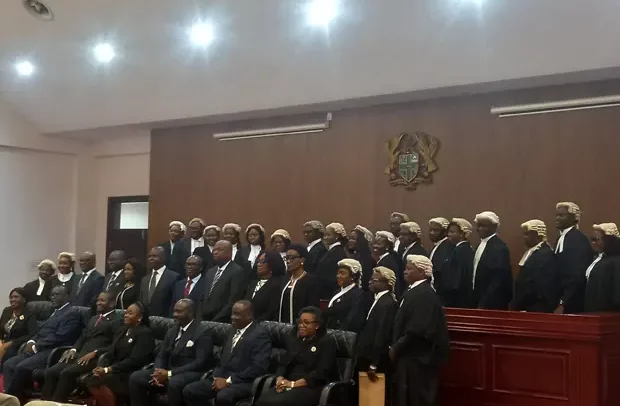Chief Justice Gertrude Torkornoo has urged judges to always remember the ethical values with which they are supposed to conduct their work, including the need to work in truth, fairness as well as working in propriety, independence and competence.
According to her, the peace and stability that the nation enjoys and takes pride in is sustained largely in part by the confidence citizens have in the durability of the legal and judicial systems.
“A robust judiciary needs in equal measure quality laws and quality judges and magistrates to discharge its constitutional mandate,” she said.
The Chief Justice was speaking at a swearing-in ceremony for 23 new magistrates – 11 males and 12 females in Accra yesterday.
Justice Torkornoo said the job of a judge is to lead the various actors in the courtroom in the united pursuit of truth and justice guided by the principles of equity and fairness and administered always in accordance with law.
She, therefore, urged the new magistrates to be mindful of the oaths that they took and to stay faithful to the solemn promises they have made to the nation, their fellow citizens and to God.
She reminded them that the work of a judge is one that requires strong intellect and independent thinking, hence urged them to remain abreast of the ever-evolving trends of the legal and judicial procedures in this age of technology.
“When we say the law rests in the bosom of the judge it means that the judge understands the law, the judge appreciates the intersectionality of the law and is able to identify which part of law, whether it is procedure, whether it is the substantive rules of evidence or the rules of the transactions before the judge. The judge understands which one must take priority,” she said.
Justice Torkornoo pointed out that judges are expected to ignore and erase any personal feelings and biases as it is not the job of a judge to please, but if done right, judicial decisions must bring satisfaction.
“If you are transparent and if you act properly, even those you rule against would say ‘thank you’ with a smile. This requires extreme dedication, integrity and unyielding adherence to principles,” she pointed out.
Justice Administration
Justice Torkornoo also stated that as Chief Justice, she has committed herself and her tenure to the improvement of the overall conditions of justice delivery to the citizens of this country for whose sake the administration of justice has been entrusted to the Judiciary by the 1992 Constitution.
She noted that the wheels of justice may seem to grind slowly, but they must be helped along with the right activation of systems put in place by the rules of court, practices of the court and administrative structures.
“Our commitment to deliver justice effectively and efficiently must manifest itself in the efforts of all judges to improve the efficiency, effectiveness and integrity of the processes before them,” she stressed.
More Females
Justice Torkornoo also observed that the “Judiciary is getting extremely feminised” as more women are getting opportunities in the Judicial Service.
“Very soon when all of you move up, it’s likely that the Supreme Court may have more than 70 percent women rather than the other way round,” she stated.
This, she said, means the magistrates should be ready to move to any part of the country that they would be posted to, as there are District Courts in all corners of the country, “and we serve the nation from those corners.”
“Gone were the days when ladies were restricted in the cities and in the towns. Now we go into the hinterlands because the Judiciary is highly feminised,” Justice Torkornoo added.
Deputy AG, GBA
Deputy Attorney General, Alfred Tuah-Yeboah, admonished the new magistrates to administer their duties with diligence and integrity, and without fear, favour, affection or ill will.
He also urged them to respect the power that they have and not veer into the powers of others, adding that to accept this office of Judiciary is a singular honour.
President of the Ghana Bar Association (GBA), Yaw Acheampong Boafo, in a speech read for him by Agbesi Dzakpasu, told the new magistrates that they are under obligation to use their new power and authority to serve all persons who appear before them and not to engage in abuse of power.


